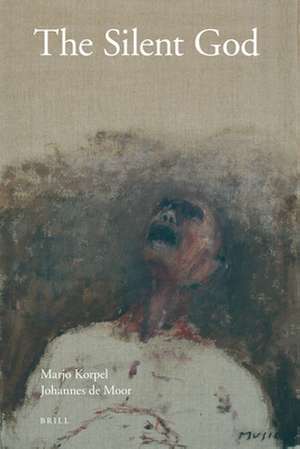The Silent God
Autor M.C.A. Korpel, Johannes C. de Mooren Limba Engleză Paperback – 18 apr 2012
Preț: 409.55 lei
Preț vechi: 481.82 lei
-15% Nou
Puncte Express: 614
Preț estimativ în valută:
78.37€ • 82.41$ • 64.75£
78.37€ • 82.41$ • 64.75£
Carte indisponibilă temporar
Doresc să fiu notificat când acest titlu va fi disponibil:
Se trimite...
Preluare comenzi: 021 569.72.76
Specificații
ISBN-13: 9789004232990
ISBN-10: 9004232990
Pagini: 378
Dimensiuni: 155 x 235 x 23 mm
Greutate: 0.59 kg
Editura: Brill
Colecția Brill
ISBN-10: 9004232990
Pagini: 378
Dimensiuni: 155 x 235 x 23 mm
Greutate: 0.59 kg
Editura: Brill
Colecția Brill
Cuprins
1. The Silent God in Modernity .
1.1 Introduction
1.2 The Silent God in Modern Literature and Media
1.3 Some Theologians and Philosophers
1.4 The Silent God in Agnosticism and Atheism
1.5 In Defense of a Silent God
1.6 Critical Examination of Current Views
2. Prerequisites for a Fresh Investigation
2.1 De_ning the Scope of This Study
2.2 The Human Nature of Religious Language
2.3 Silence Presupposes Speech
2.4 The Silent God: The Biblical Roots
2.5 The Silent God: The Biblical World
2.6 Why This Approach?
3 Silence between Humans in Antiquity
3.1 Introduction
3.2 Reasons for Silence between Humans
3.3 Conclusions on Silence between Humans
4. How Did Man Address the Deity?
4.1 Introduction
4.2 Songs and Prayers
4.3 Letters to Deities
4.4 Magic and Sorcery
4.5 Silence of Man before the Deity
4.6 Conclusions on Man Addressing the Deity
5. How Did the Deity Address Man?
5.1 Direct Communication between Deity and Man
5.2 Communication through Intermediaries
5.3 Dreams, Visions, Oracles, Omina
5.4 Conclusions on the Deity Addressing Man
6. The Silent God
6.1 The Silence of the Remote God
6.2 Broken Communication between God and Man
6.3 Conclusions on Divine Silence
7. Epilogue
7.1 Faith Talk
7.2 God's Word in Human Guise
7.3 Synergy
7.4 Is Revelation Still Possible?
7.5 Bearing Witness to a Silent God
7.6 The Courage to Become a Witness
7.7 The Integrity of Witnesses
7.8 Theodicy
7.9 Believers and Unbelievers
1.1 Introduction
1.2 The Silent God in Modern Literature and Media
1.3 Some Theologians and Philosophers
1.4 The Silent God in Agnosticism and Atheism
1.5 In Defense of a Silent God
1.6 Critical Examination of Current Views
2. Prerequisites for a Fresh Investigation
2.1 De_ning the Scope of This Study
2.2 The Human Nature of Religious Language
2.3 Silence Presupposes Speech
2.4 The Silent God: The Biblical Roots
2.5 The Silent God: The Biblical World
2.6 Why This Approach?
3 Silence between Humans in Antiquity
3.1 Introduction
3.2 Reasons for Silence between Humans
3.3 Conclusions on Silence between Humans
4. How Did Man Address the Deity?
4.1 Introduction
4.2 Songs and Prayers
4.3 Letters to Deities
4.4 Magic and Sorcery
4.5 Silence of Man before the Deity
4.6 Conclusions on Man Addressing the Deity
5. How Did the Deity Address Man?
5.1 Direct Communication between Deity and Man
5.2 Communication through Intermediaries
5.3 Dreams, Visions, Oracles, Omina
5.4 Conclusions on the Deity Addressing Man
6. The Silent God
6.1 The Silence of the Remote God
6.2 Broken Communication between God and Man
6.3 Conclusions on Divine Silence
7. Epilogue
7.1 Faith Talk
7.2 God's Word in Human Guise
7.3 Synergy
7.4 Is Revelation Still Possible?
7.5 Bearing Witness to a Silent God
7.6 The Courage to Become a Witness
7.7 The Integrity of Witnesses
7.8 Theodicy
7.9 Believers and Unbelievers
Notă biografică
Marjo C.A. Korpel, D.D. (1990), Theological University, Kampen, is Associate Professor of Old Testament at Utrecht University. Her publications concern Canaanite and Israelite religion, as well as Old Testament exegesis. Among her books are A Rift in the Clouds: Ugaritic and Hebrew Descriptions of the Divine (Ugarit-Verlag, 1990) and The Structure of the Book of Ruth (Van Gorcum, 2001). She is the Executive Editor of the Pericope series.
Johannes C. de Moor, Ph.D. (1971), Free University, Amsterdam, is emeritus Professor of Semitic languages of the Theological University Kampen, Netherlands. He has published extensively on Ugaritic, Hebrew and Targumic Aramaic. He is editor of many international publications and is a honorary member of several learned societies.
Johannes C. de Moor, Ph.D. (1971), Free University, Amsterdam, is emeritus Professor of Semitic languages of the Theological University Kampen, Netherlands. He has published extensively on Ugaritic, Hebrew and Targumic Aramaic. He is editor of many international publications and is a honorary member of several learned societies.
Recenzii
John Day, Oxford: "a remarkably wide-ranging and learned book on a highly topical theme"
David Clines, Sheffield: "The Silent God is a most unusual and distinctive work, rich and original in its range and in its angle of vision on the sources. It will be an important resource for all those concerned with the contemporary value of the Hebrew Bible/Old Testament."
David Clines, Sheffield: "The Silent God is a most unusual and distinctive work, rich and original in its range and in its angle of vision on the sources. It will be an important resource for all those concerned with the contemporary value of the Hebrew Bible/Old Testament."
